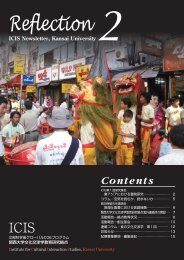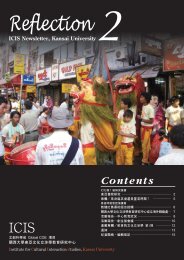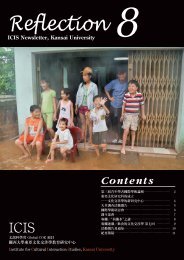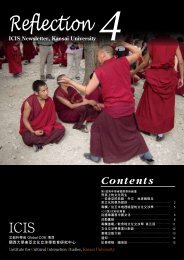English
English
English
Create successful ePaper yourself
Turn your PDF publications into a flip-book with our unique Google optimized e-Paper software.
The Third ICIS International Forum: Chinese Culture Viewed from the Peripheral Perspective<br />
On January 24, 2009, the third international forum, “Chinese Culture Viewed from the Peripheral Perspective,” was<br />
held in the seminar space on the fourth floor of Ibun-kan at Kansai University. Following the special lecture by the COE<br />
visiting scholar Dr. HIRANO Kenichiro, ICIS research groups reported their studies and engaged in active discussions.<br />
The followings are reports of the conference.<br />
Part 1: Special Lecture<br />
A Theory of International Cultural Interactions<br />
HIRANO Kenichiro (COE Visiting Professor)<br />
Prof. HIRANO had<br />
began with research on<br />
Manchuria and then<br />
further to the theory of<br />
international relations.<br />
But while studying in the<br />
United States he came<br />
across the studies of<br />
Benjamin Isadore<br />
SCHWARZ about YAN<br />
Fu, who had translated<br />
works of Western thoughts into Chinese. Afterward, Prof. HIRANO<br />
had translated SCHWARZ’s master piece, In Search of Wealth and<br />
Power: Yen Fu and the West. Influenced by this translation, studies<br />
regarding Yan Fu increased in Japan, and research interests about him<br />
had also grown from then on. Through his studies of YAN Fu, who<br />
thought deeply about the West and China under the conflict between<br />
modernity and tradition, Prof. HIRANO gained an interest to<br />
comprehend cultures and their boundaries. “The Theory of<br />
International Culture,” submitted by Prof. HIRANO, explains<br />
international relations from a cultural view with reference to both the<br />
cultural transformation theory and the cultural contact theory as well.<br />
It is a new theory of cultural contact and transformation. In the<br />
modern day, international cultural interactions are getting more rich,<br />
diverse and rapid. While people from different social classes,<br />
including the common people, has been involved in those interactions,<br />
making studies on individual aspects would become necessary.<br />
Part 2: Northeast Asia Group<br />
A Zen Monk’s Lecture and Muromachi Culture<br />
in Japanese Medieval Times<br />
HARADA Masatoshi (ICIS, Kansai University)<br />
In medieval Japan, Tendai<br />
Buddhists and Zen Buddhists<br />
had traveled around Japan,<br />
China, and the Korean<br />
peninsula, and many traveling<br />
Buddhists visited Japan in the<br />
late Kamakura period as well.<br />
Through these exchanges, large<br />
numbers of documents were<br />
imported and accumulated in<br />
the five temples included in the Five Mountain System of Kyoto and<br />
Kamakura. In particular, Enni brought a vast collections to Tofuku-ji<br />
temple, and those documents in this temple include not only Zen<br />
scriptures, but a wide range of other writings such as the latest<br />
Confucian canons and others. Based on these documents, the system of<br />
knowledge from the continent developed within Japanese society by<br />
preachings and discussions. The fourteenth century Zen monk Gido<br />
Shushin had greatly influenced ASHIKAGA Motouji and the dignitaries<br />
around the Kamakura Kubo, as well as ASHIKAGA Yoshimitsu in<br />
Kyoto and other high-ranking people in the imperial court and the<br />
shogunate. As a result of these activities, information about Chinese<br />
Buddhism and society, in particular Zen Buddhism, began to permeate<br />
Japanese society. Zen thought became widely accepted in Japanese<br />
society, and many Zen words were used in “Noh” theatre in particular,<br />
presenting the viewpoints of Zen in important scenes. Furthermore, Zen<br />
had changed the society’s view of women. These discussions impacted<br />
the people of the early Muromachi period who came to share the<br />
knowledge of the continental culture, especially with regards to Zen<br />
Buddhism.<br />
6












